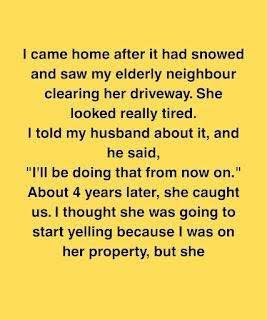I came home after a heavy snowfall to find my elderly neighbor, Mrs. Felicita Aguilar, struggling to clear her driveway. She looked exhausted, her movements slow and labored. I mentioned it to my husband, Renan, and he nodded firmly, saying, “I’ll be doing that from now on.”
Fast forward about four years, and there we were, caught in the act. I thought Mrs. Aguilar would scold us for being on her property, but instead, she smiled and said, “Looks like you two finally got caught red-handed.”
I blinked in surprise, still gripping the shovel, while Renan froze behind me, leaning on his own. It was 6 a.m. in mid-January, and we had been sneaking over to clear her driveway before work every time it snowed. She had a long, cracked concrete driveway that sloped down, turning dangerously slick each winter.
That first year, we had knocked on her door to offer help, but she never answered. I think she was proud or simply didn’t want to impose. So, we just… did it. We’d tiptoe out early, clear her driveway and porch, and slip back home before our kids woke up.
She had to have known. The snow didn’t just vanish after every storm. But she never acknowledged it—until that morning.
Standing at the top of the steps in a robe that looked older than I was, she held a chipped coffee mug. “Come inside,” she said. “I’ve got banana bread.”
Renan and I exchanged puzzled glances but followed her inside.
Her name was Felicita, but she insisted we call her Feli. We’d lived next door for seven years and had never called her anything but “our neighbor.”
Inside, her home smelled of oranges and old books, filled with lace doilies and a wall of family photos, some featuring the same faces repeated over the years.
“Have a seat,” she motioned toward a plastic-covered couch. “You’ve been good to me. It’s time I returned the favor.”
We tried to laugh it off, insisting it was no big deal, but she waved us off and started slicing the banana bread as if she were cutting diamonds.
“You know,” she began, handing us warm slices on mismatched plates, “you two remind me of someone.”
“Who?” I asked, intrigued.
She stared out the window, a distant look in her eyes. “My son and his wife. Before she left him.”
Renan and I nodded politely, surprised to learn she had a son.
“He moved away,” she continued. “Lives in Nevada now. I haven’t seen him in thirteen years. Haven’t seen my granddaughter since she was two.”
Her tone was flat, as if she were stating facts rather than seeking pity.
We sat with her for an hour that morning, just listening. She shared stories of her late husband, her garden, and the church down the street that had stopped delivering communion after COVID.
After that day, everything shifted.
We didn’t just shovel anymore. Renan began mowing her lawn in the spring, and I brought her soup when she fell ill. She even started giving our daughter Lia piano lessons.
Feli had her own little ways of showing gratitude. A jar of guava jam here, a hand-written note tucked in our mailbox there. Once, she gifted me a scarf she’d knitted, saying, “You’ve got good shoulders. Show them off.”
One day, she simply handed Renan an old record player. “My husband’s,” she said. “Better in your hands than in a box.”
Renan, usually the quiet type, took it like she was passing down a sacred heirloom.
Then came the envelope.
In early June, we found it in our mailbox—no stamp, just tucked inside. On the front, in delicate cursive: “For the Gutierrez Family.”
Inside was a note with just one line: “Please don’t sell the house until you talk to me.”
I ran next door.
When Feli opened the door, she looked calm, but her hands were shaking. She motioned me inside. I noticed a suitcase by the couch.
“I think it’s time I go see him,” she said.
“Your son?” I asked, surprised.
She nodded. “We’ve said worse things than I can remember. But maybe there’s still time.”
I didn’t know what to say, so I simply squeezed her hand.
Two days later, she left, asking us to water her ferns and take whatever we wanted from the fridge.
She didn’t call or write.
After three weeks, I began to worry. I dialed the number she’d scribbled on the back of a banana bread recipe card she had given me.
A woman answered.
“Hi, I’m calling for Mrs. Aguilar?”
Silence. Then, “Who is this?”
I explained who I was and how Feli had lived next door to us for years.
The woman replied, “This is Maria. I’m her granddaughter.”
My heart raced. “She told us about you. She said she hadn’t seen you since you were little.”
Maria paused. “She’s here,” she said finally. “But she’s not doing well.”
She handed the phone to someone else.
It was Feli’s son, Mauro.
He sounded older than I expected, worn out. “She had a stroke on the flight,” he said. “They got her to a hospital, but it took a toll.”
I asked if we could visit. He hesitated but then gave me the address.
We booked flights for that weekend, bringing Lia with us.
When we arrived, Feli was thinner, her words slurring slightly. But when she saw us, she smiled as if she had been waiting years.
She reached out to touch Renan’s face like he was family. “You’re here,” she said slowly but clearly.
Mauro stood in the doorway, arms crossed, watching.
That night, we stayed in a motel nearby. The next morning, Maria invited us for breakfast.
Their house was filled with boxes—things Feli must have mailed over the years: doilies, tins, letters.
Maria pulled out a photo album. One picture showed Lia at her last piano recital. “She sent us this,” Maria said. “We didn’t know who the girl was.”
Renan smiled. “That’s our daughter.”
I saw something shift in Mauro’s expression, like a door opening.
He had been angry for a long time, blaming Feli for things that never fully made sense to us—family tensions, old debts, who was present when his father died.
But witnessing how she treated us, he said, “Maybe I missed something.”
Before we left, he hugged his mother—the first time in over a decade.
Two months later, Feli passed away.
We learned of her passing through a letter from a lawyer.
She had left us something.
Not money. Not jewelry.
The house.
At first, we couldn’t believe it. But the lawyer confirmed it: her will had been updated just three weeks before her trip.
Inside the record player, we found a copy of the will.
With tears in our eyes, we went over to her house. It was just as she had left it. The scarf she’d knitted me still draped over the chair.
But taped to the fridge was a note:
“Don’t keep this if it feels heavy. But if it feels like home, then I did right.”
We decided not to keep the house. We spoke with Mauro and Maria and agreed to sell it, splitting the proceeds with them.
Maria cried, saying her grandmother would have loved that.
But we did keep something.
That old record player? It sits in our living room. Every Saturday, we play her husband’s jazz records while making pancakes.
And sometimes, we shovel other neighbors’ driveways—quietly, without knocking.
Because the smallest act of kindness can carry someone for miles.
And you never know what someone is really holding in their heart—until they let you in.
If this reminded you of someone special—or a neighbor who became more—hit like and share this. You never know whose heart might need it.


